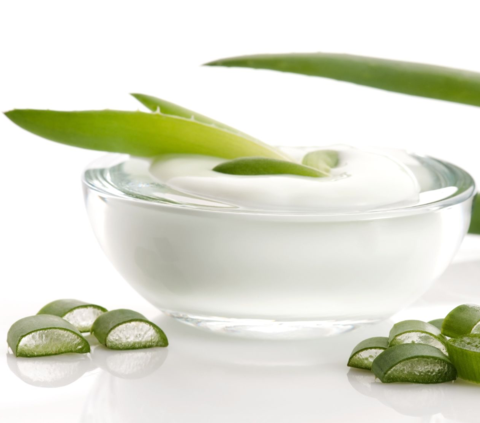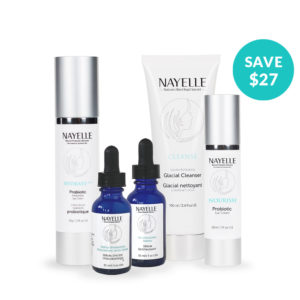Benefits of Probiotics and Retinol

We truly believe that the source of gorgeous skin is a healthy inside. If you flip through health and beauty magazines on a daily basis, then you have undoubtedly noticed the surge in probiotic popularity over the last couple of years.
Most of these articles and ad campaigns target how these friendly bacteria rectify our insides and keep our immune system in tip-top shape, but there hasn’t been as much light shed on how probiotics can benefit us when applied topically.
We lovingly refer to probiotics as our skincare “friend with benefits” because they practically address every problematic skin condition that exists from acne to premature aging.
Traditional skin care products are often packed with detergents, disinfectants, harsh cleaners and chemicals that actually destroy this friendly bacteria that benefits our skin.
Destroying the good bacteria on our skin increases the risk of hosting harmful bacteria on the skin’s surface. They also may help tame gas, diarrhea, and other digestive problems.
Probiotics are bacteria and by having probiotics in your skin regimen means to put bacteria on your skin.
 Sounds gruesome? But bacteria might be the solution to your life long skin problems. Your skin, too, naturally plays host for a number of good bacteria. But external factors (like pollution) and harsh formulas in your skincare routine can kill off these good bacteria. That’s when you get into trouble.
Sounds gruesome? But bacteria might be the solution to your life long skin problems. Your skin, too, naturally plays host for a number of good bacteria. But external factors (like pollution) and harsh formulas in your skincare routine can kill off these good bacteria. That’s when you get into trouble.
As we get older, the pH level of our skin becomes more basic, triggering enzymes that break down collagen and elastin. Many probiotics can lower the skin’s pH and turn off some of those collagen-degrading enzymes, says Bowe, who recommends both topical and oral probiotics to patients. You probably already have some in your refrigerator.
“I use a Greek-yogurt mask once a week for about ten minutes,” says Bowe. “We know that bacteria on the skin have an effect, but we do not know which bacteria are good and which are bad,” says Leslie Baumann, a dermatologist in Miami. It’s a promising area, but for now, experts are undecided.
Benefits of using Probiotic Skin Care products
- Smooth dry skin
Look for probiotics in a night cream to give the active cultures a full 8 hours to do their dirty work. Here, the probiotic technology helps your skin retain the moisture it has while natural butters feed your skin restorative antioxidants that combat fine lines and wrinkles.
- Minimize redness or rosacea
Facial redness, chronic or not, is caused by inflammation, which makes your blood vessels visible at the skin’s surface. This liquid makeup actually treats facial redness while you wear it. Little invisible yellow- and green-tinted pearls neutralize and camouflage the visual redness while active probiotic Lactobacillus and a slew of natural extracts calm, soothe, and strengthen the skin’s barrier to lessen redness over time.
- Fix fine lines and dullness
The active probiotics stimulate your skin to produce its own anti-aging ingredients including collagen, hyaluronic acid, and antioxidants while rice beads and AHAs gently buff your skin to a smoother, brighter finish. And since it’s made with natural, allergen-free fragrances and ingredients, it’s suitable for vegans and those with very reactive skin.
- Calm stressed-out skin
The probiotics boost your skin’s natural defenses against environmental damage while calming down seriously stressed skin with cucumber, pinus bark, and Frangipani extracts. It also helps in redness, stress, and aging. Probiotics can prevent wrinkles. Good bacteria in your gut can help you eliminate the toxins and free radicals that can damage skin and cause early signs of aging. Probiotics give you a glowing complexion. It can help you digest and better assimilate the nutrients from your food. That means your skin receives more of the antioxidants, vitamins and minerals it needs to be healthy.
- Perk up a tired face
Consider this your skin’s daily cup of coffee. Probiotics fight off free radicals and environmental damage, and renew itself for younger-looking skin faster.
- Aging skin
Probiotics may also protect the skin against photo aging. A recent study examined the impact of orally supplementing mice with a bifidobacterium strain prior to UVB radiation, three times weekly for 7 weeks. Compared to controls, supplementation significantly suppressed changes in transepidermal water loss, skin hydration, epidermal thickening, and attenuated the damage to the tight junction structure and basement membrane induced by chronic UVB irradiation, possibly via measurably-decreased interleukin-1-beta production in the skin. This study confirmed prior research from 2014, where mouse supplementation with a bifidobacterium strain attenuated UV-induced barrier perturbation and oxidative stress of the skin, possibly via reduced generation of reactive oxygen species.
What is Retinol?
Retinol is a form of Vitamin A called Retinoid. It is a small nutrient that easily penetrates the skin. Once absorbed, it is converted into retinoic acid, which is found in the prescription wrinkle fighter Retin A. It combats aging by increasing cellular turnover, exfoliating, and increasing collagen and elastin production. It is fat-soluble and helps keep vision sharp and bones strong. Retinol can be produced synthetically.
Benefits of using Retinol
- Retinol helps to resurface and rejuvenate the skin, leaving users with skin that is more vibrant, clear and youthful.
- Retinol has an extremely small molecular structure. This tiny structure is what enables retinol to penetrate deep into skin and go to work smoothing wrinkles and improving skin.
- Vitamin A in this form has the ability to improve the elasticity of the skin, smooth wrinkles and lines and increase moisture. The complexion is left, smooth, glowing and the damage that is done from age and the environment is greatly minimized and even reduced.
Retinol side effects
- Irritation
Initial irritation is normal as your skin gets used to the ingredient, but can be avoided by gradually incorporating it into your routine. Retinol causes your skin to peel and flake, but it is not as extreme as a chemical peel. This exfoliating effect is beneficial and a sign of increased cellular turnover and dead skin removal. After a few weeks of daily use, skin flaking will no longer be visible because such a small amount is sloughing off. It can be annoying in the beginning, but don’t pick at the flakes. You can try to remove them by gently scrubbing with a wet washcloth. Retinol side effects can be very irritating if you start off using too strong of a formulation.
- Skin will be extra sensitive.
Retinol can cause your skin to become extra sensitive to sunlight because it exposes fresh skin. - Skin burns easier.
- Skin will be prone to discoloring with sun exposure.
- Sunlight reacts with retinol negatively and makes it ineffective.
- You skin can develop red, inflamed, itchy patches, which are not usually serious and won’t leave any permanent damage.
- Skin will be dry.
Clearly we have a winner, since Probiotic technology doesn’t give any negative feedback since first of all it is all natural and all organic, it will give you amazing results without the fear of experiencing its side effects. NAYELLE is one of the leading cosmetic companies in the market right now that produces a variety of all natural products that you can choose from. You can choose to use NAYELLE for your morning routine and your “before bedtime” routine without worrying if you are doing too much.

